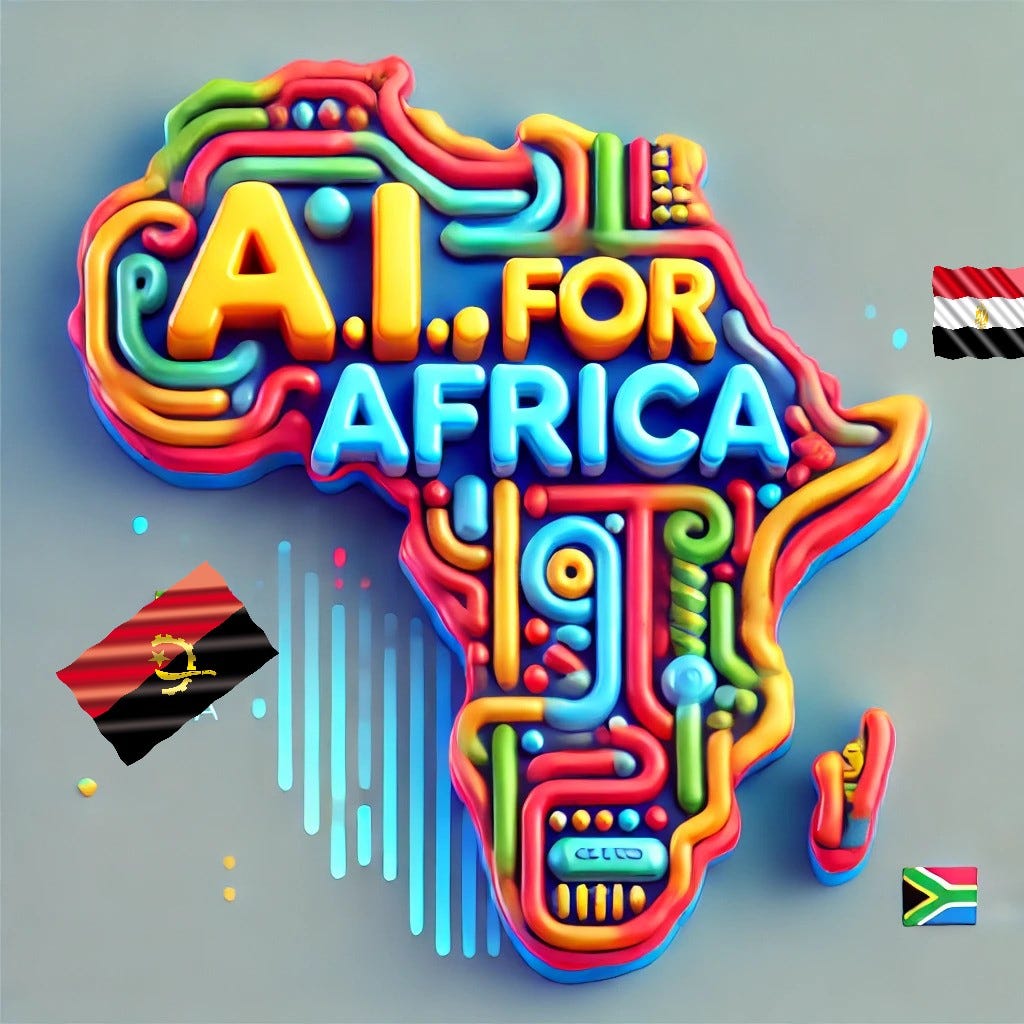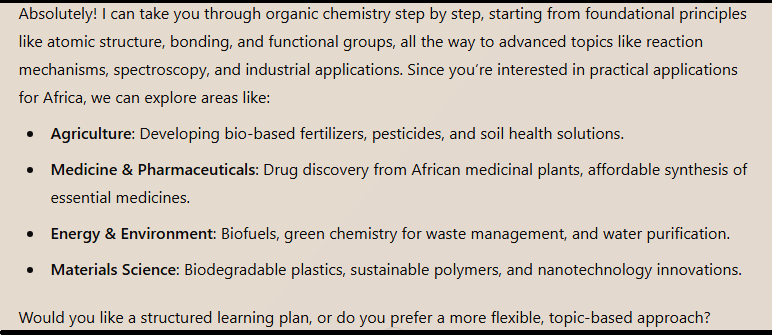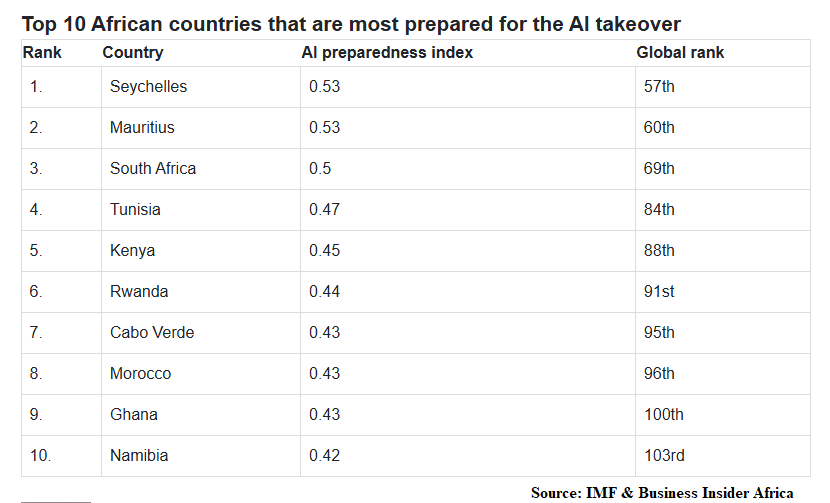Rethinking Artificial Intelligence for Africa
Why The Continent’s Path to Harnessing AI’s Potential for Functionality, Profitability & Impact Must Be Different (AI Series Part 3)
Did you know it cost OpenAI about 78 million dollars to train GPT-4 and Google over 191 million dollars to train Gemini Ultra? 1
That’s a significant chunk of the budget of several African countries. For example, Kenya’s 2024/2025 budget for the growth of the Blue Economy was 11.3 billion Kenya Shillings, which is about 87 million USD—less than half what Google invested. 2
Private-wise, you will be hard-pressed to find independent labs on the continent that can pull that kind of money.
As for government investment, yes, governments can choose to prioritize AI like they do something like the Blue Economy and set aside a decent budget, but African governments do not have a good track record of investing in research.
The only country that might pull it off is Rwanda. ‘Might’ being the operative word because the cost could prove too prohibitive. If that is not enough, the equipment cost and severe data gaps also hinder AI development in Africa.
What now? If Africa can’t afford to build complex AI models, how can the continent still leverage AI and compete with the world?
By being as cunning as the tortoise.
In Lower Primary (ages 6–8), Kenyan children read the story of the sneaky tortoise who challenged the hare to a race. Knowing he couldn’t match the hare’s speed, the tortoise recruited fellow tortoises to position themselves along the track, hiding inside their shells like ordinary rocks.
As the race began, each hidden tortoise took turns emerging and moving forward whenever they heard the hare’s footsteps. Overconfident in his speed, the hare never noticed. Just as he was about to cross the finish line, the last tortoise—the original challenger—emerged from disguise and won the race.
Likewise, in a straight race, Africa cannot go toe-to-toe with the EU, UAE, US, and other AI powerhouses.
However, it can be strategic by taking advantage of every available loophole to ensure AI in the continent is not just functional but profitable and impactful.
How to Intelligently Leverage AI for Maximum Impact in Africa
Bridge education gaps.
Bridge startup funding gaps.
Refine ideas and brainstorm solutions for Africa’s perennial issues.
Maximize open source.
Advocate for a critical mass of Africans to master AI skills.
Bridge Education Gaps
In one of my many debates with my brother (you guys have met him in this article, right?), he argued that if LLMs were the repository of all human knowledge, and anyone could access that knowledge via a single prompt, then school would soon become unnecessary.
I argued the contrary (because what is a sister if not a lifelong contradictor), but he had a point. Yes, my argument was equally valid that schools were still needed to teach foundational concepts and offer accountability in the form of teachers.
Still, once a student reaches a certain level, they can learn just as effectively from an LLM as they would from a teacher.
“Hey GPT,” a student can ask, “please teach me in depth and breadth organic chemistry. I want to start with the foundational concepts, all the way to practical application scenarios. In particular, I want to know how to apply organic chemistry concepts to solve some of Africa’s problems.”
P.S. This was GPT's response to that prompt.
Do you see what this means? There are so many brilliant Africans who cannot afford higher education. LLMs can be their higher education. What’s incredible is that we live in an era where employers value demonstrable skill rather than a degree. 3
Even with primary and high school education, LLMs can be invaluable. Sal Khan’s book Brave New Words puts it perfectly.
In much of the world, limited resources, inadequate infrastructure and a shortage of skilled teachers create formidable barriers to learning.
Places like Sub-Saharan Africa and South Asia experience alarmingly low primary school completion rates, with countless children unable to attend school or forced to drop out due to poverty or conflicts.
Also, in much of the world, deep-rooted discrimination toward girls and marginalized communities further hinders access to education. While millions of children do not go to school every year, girls are twice as likely never to set foot in a classroom.
Data back this up with UNESCO noting that approximately 98 million children in Sub-Saharan Africa are out of school currently4 and that number keeps growing as conflicts, war, climate change disasters, and poverty increase.
Access to LLMs or specialized platforms built on top of AI, like Khanmigo, can help bridge the gap.
Bridge Startup Funding Gaps
Africa receives less than 2% of global startup funding, and recent data shows that this share might decline even further. In 2024, venture capital funding in Africa dropped to $2.2 billion, a 25% decrease from 2023. 5
Even worse, most of this funding is concentrated in a few African countries (Kenya, Nigeria, South Africa, and Egypt), yet talented founders can be found in all 54 African countries.
AI will not directly close this gap, but large LLMs give Africans with ideas a chance to develop them without funding.
The biggest advantage of funding is that a founder can assemble a talented team to help build their idea. With AI, a founder can learn the skills they need quickly, then use AI no-code tools to develop the product and release it to the market.
Let’s play this out practically. Say a doctor has an idea on reducing the spread of communicable diseases in Africa but lacks the technical skills to develop the concept or the money to hire a team.
In their free time, they can use GPT to learn the basics of developing an idea and some coding skills. Later, the doctor can shift to Claude to write some code or rely entirely on no-code tools to build and launch the MVP to the public.
Sure, it might take the doctor longer, but at least he has a path to developing the idea. In contrast, before LLMs, the doctor might have given up because the juggling required to acquire relevant skills from multiple sources would have been too cumbersome.
Essentially, AI will make it easier for founders to bootstrap.
Refine and Brainstorm Solutions For Africa’s Perennial Problems
The best way to demonstrate this is with an example. A while ago, I posed this question to GPT:
If you were the AI president of Kenya, what would you do in 5 years to turn Kenya into a first-world country?
Yes, GPT regurgitated much of the usual regarding development in Africa, but it had some pretty interesting ideas, too. For example, civic participation.
It sounds simple, but why has no Kenyan government considered implementing such a policy? If such a platform existed, it would have eliminated the need for the 2023 situation where Kenyans had to reject the finance bill through street demonstrations.
The more complex and nuanced the LLMs get, the more value they will provide when answering prompts. That will be invaluable for entrepreneurs looking to brainstorm or refine ideas for complex issues in Africa.
Maximize Open Source AI
When DeepSeek made R1 (their first reasoning model) open source, they essentially pulled back the curtain on their AI model, giving everyone unrestricted access to its code and parameters.
This means anyone (researchers, developers, or enthusiasts) can use, tweak, and build upon it without limitations. It contrasts sharply with the usual approach, where AI models remain locked behind proprietary walls.
Key takeaways about DeepSeek R1 being open source:
Accessibility: Anyone can access, modify, and experiment with the model’s code and weights.
Community-driven innovation: A broader community now has the opportunity to refine and enhance the model.
Transparency: With open access, the inner workings of R1 are exposed, allowing for deeper scrutiny and understanding.
Lower barriers to entry: By removing restrictions, DeepSeek has made AI development more accessible and cost-effective.
Were you able to note that last point? Africans can deal with the cost challenge by leveraging open-source AI, which is COST-EFFECTIVE!
Europe, the force behind OpenEuroLLM,6 currently in development, has promised to ensure the model will be truly open.
This means Africans do not have to reinvent the wheel, at least not yet. Any African interested in building AI solutions can build upon what already exists.
One Kenyan software engineer did this during the finance bill protests. He built a Finance Bill GPT to help Kenyans understand the bill.7
More Africans should follow Kelvin’s example.
Advocate For a Critical Mass of Africans to Master AI Skills
Have you noticed an interesting trend where many CEOs of big tech companies in the US are Indians? For example:
Alphabet/Google–Sundar Pichai
Microsoft–Satya Nadella
YouTube–Neal Mohan
Palo Alto Networks–Nikesh Arora
Of these four CEOs, three were born and studied in India. They are the fruit of India's investing significantly in tech education in the mid and late 20th century (1960s-1999). India now has a large population with incredible tech skills, and they are making their way into the top tech offices in the United States.
More than that, India has become a global leader in exporting IT services and talent. Did you know that India's IT market size (mainly the export) grew from $67 billion in 2008-2009 to $191 billion in 2019-2020?
Talented labor will always be in demand globally, and equipping talented Africans with AI skills with export as the goal can prove to be an excellent bet.
Yes, not everyone can study technology, but Africa should create a critical mass of AI professionals who can meet the projected demand. A 2020 World Economic Forum report predicted that AI would create 97 million jobs by the end of this year.8 One can only imagine how many more will be created in the next decade!
Beyond the export of talent, if more Africans make it to those top offices globally, transferring that knowledge back to the continent will be easier.
Luckily, many organizations currently offer free AI courses to get you started. Here is a list of some good ones.
AI for Everyone by deeplearning.ai (Platform: Coursera)
Riley Brown YouTube Channel (provides practical tutorials on using AI tools to build real businesses on automate work)
Harvard’s Introduction to Artificial Intelligence with Python (Platform: edX)
5-Day Gen AI Intensive Course with Google (March 31st to April 4th)
The Statistics Thus Far About What AI Could Do For Africa
AI is set to boost Africa’s economy by $30 billion (The Digital Opportunity of Sub-Sharan Africa Report commissioned by Google).9
Digital infrastructure, innovation & economic integration, human capital and labor market policy, and regulation & ethics are critical for AI readiness in Africa (International Monetary Fund). 10
These are the top 10 African countries most prepared for AI takeover.
Take Away
Soon after the launch of ChatGPT, a well-known tech bigwig commented that the digital divide in which Africa was already leagues behind the world technology-wise had become unassailable.
He had a point, but it might be the opposite. AI might be the thing that hastens the closing of that divide, but only if the continent embraces the craftiness of the tortoise.
What do you think?
References
https://www.forbes.com/sites/katharinabuchholz/2024/08/23/the-extreme-cost-of-training-ai-models/
https://www.treasury.go.ke/wp-content/uploads/2024/06/2024-Budget-Statement-for-the-FY-2024-25F.pdf
https://openeurollm.eu/
https://www.weforum.org/publications/the-future-of-jobs-report-2020/
https://blog.google/intl/en-africa/company-news/outreach-and-initiatives/unlocking-digital-opportunity-in-africa/#:~:text=AI%20holds%20incredible%20potential%20to,productivity%2C%20AI's%20applications%20are%20vast.
Thank you for sticking this far. You’ve been reading Africa: Not an Afterthought. A publication that leads the conversation on how Africa can leverage technology, trade (particularly the AfCFTA), regional integration and Pan-Africanism to build a continent that is no longer an afterthought.
This was part 3 of an ongoing AI series that concludes in part 5.
Part 0: AI in Africa Must Be Functional, Profitable & Useful
Part 1: Artificial Intelligence: Akkadian-Level Annihilator or Lifeline for Africa?
Part 2: Beginners Guide to Generative AI
I look forward to seeing you for Part 4. If you like this, please









Great article. I believe even PMI, one of the two top Project Management methodologies has a free course on AI (https://www.pmi.org/shop/p-/elearning/practical-application-of-generative-ai-for-project-managers/el173) And yes, if we can get Africans to be conversant with AI, event the base/free tiers, it would definitely be a net positive, but only if we teach them how to leverage it (AI).